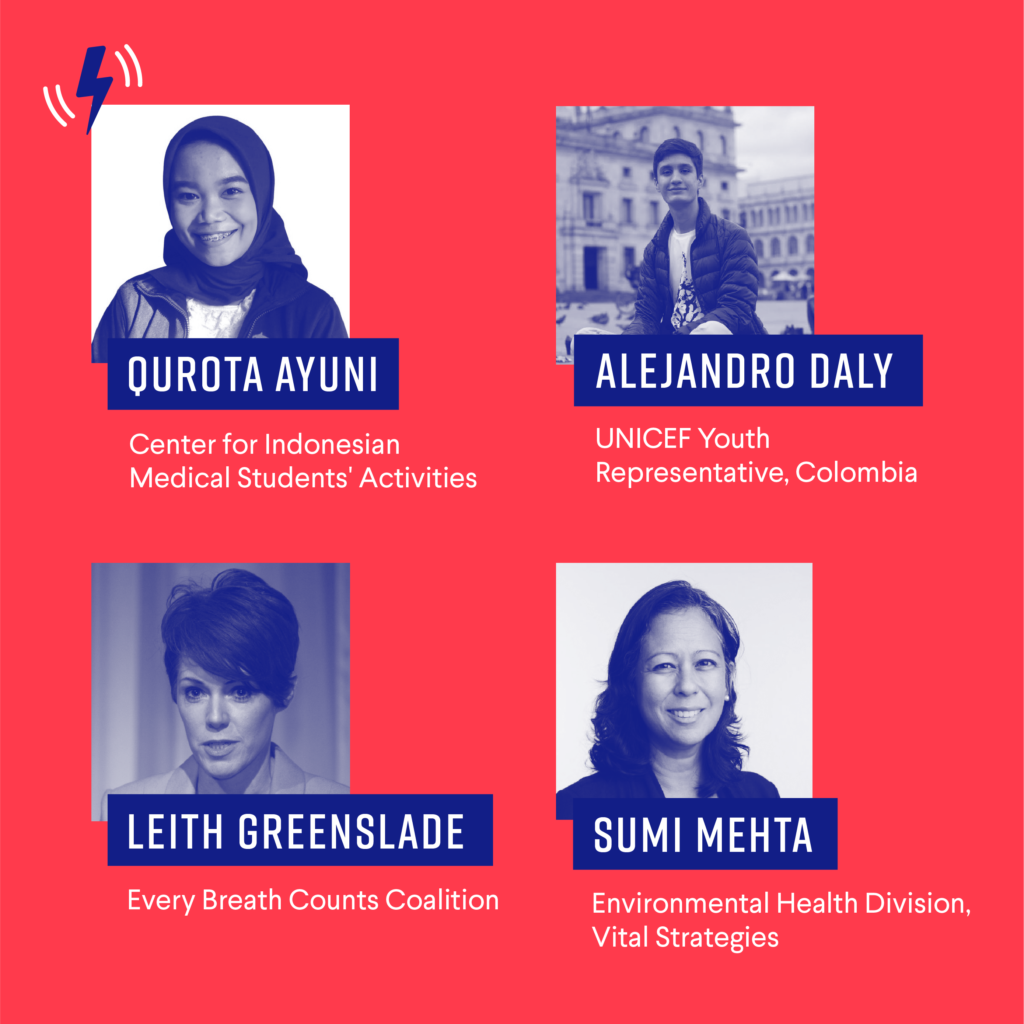Everyone has the right to clean air, whether they are commuting to work in Jakarta or preparing food in rural Ghana. Yet, despite the universal need for clean air, 90% of the world breathes polluted air, putting them at significant risk for impaired brain development, lung disease, heart disease and cancer.
Organized to raise alarm on the dangers of air pollution and to mobilize action on clean air policies, International Day of Clean Air for blue skies is marked every year on Sept. 7 and hosted by the United Nations. This year Vital Strategies recognized the day by participating in several activities and events.
1. Public Health Power Hour on air pollution, pneumonia and child health
Leading experts joined Vital Strategies’ Public Health Power Hour hosted on Twitter Spaces to discuss the growing burden of air pollution on child health, the impacts of air quality on pneumonia, the relationship between air pollution and climate action, and the need to include youth in clean air action. Here’s what they had to say:
Alejandro Daly, UNICEF Youth Representative, Colombia: “How do we connect other people to this particular agenda? As advocates our role is just that—to make people care about the things we care about. I think we need to be better. Other agendas have done it. This is the start of a revolution on how to prioritize the fight for cleaner air worldwide.”
Leith Greenslade, Every Breath Counts Coalition: “We live in a world now where in terms of infectious disease, respiratory infections are the leading killer on the planet. This brings air pollution as a leading risk factor for respiratory infection deaths center stage of the new movement to reduce deaths and risk from respiratory infections.”
Marcelo Andres Mena Carrasco, Former Minister of the Environment for Chile and Director of the Climate Action Center at Pontificia Universidad Católica de Valparaíso: “When the climate and air pollution agenda are disconnected, we are missing out on opportunities, like an opportunity to bring in the Global South. Because when you are talking about air pollution, you’re talking about an issue of climate associated with energy poverty, things that the Global North does not see sometimes.”
Sumi Mehta, Senior Epidemiologist, Environmental Health Division at Vital Strategies: “How big of a problem is air pollution for children’s health? It is a major concern. We see around 680,000 deaths attributable to air pollution in children under 5, this includes 300,000 deaths from pneumonia. This is certainly not a small number.”
Qurota Ayuni (Ayu), Center for Indonesian Medical Students’ Activities: “You (audience members) can involve the youth, youth involvement is important to this matter and we need to show the perspective of youth.”

2. Vivian Pun at the Asia Pacific Clean Air Partnership Forum: How air pollution affects women and children
The problem: While it is true that air pollution affects everyone, Vivian Pun, Air Pollution Epidemiologist at Vital Strategies, explained how air pollution specifically affects women and children. Because of traditional gender and cultural norms, women and children tend to spend more time at home, making them more likely to be exposed to household air pollution from cooking and heating with solid fuels like coal and firewood.
For pregnant women, air pollution exposure can lead to adverse birth outcomes such as preterm birth. Children also experience unique risks from air pollution because their bodies are still developing. A recent study from Vital Strategies reinforced the harms of air pollution on children’s health, finding a 19% increased risk of postnatal stunting associated with postnatal exposure to household air pollution from using solid fuels, causing negative effects for a child’s physical and cognitive health.
The solution: During her presentation at the forum, Vivian said: “We really need to communicate to the public the value of collective action for long-term solutions and recognize the limits and capacities of individual actions to influence air quality. Policy change is the most effective way to improve air quality. Public awareness and most importantly public demand for clean air is the driving force to move political will and take action.”


3. Daniel Kass: Vital Strategies urges governments and policymakers to prioritize clean air actions

In a statement on International Day of Clean Air for blue skies, Daniel Kass, Senior Vice President of Environmental Health at Vital Strategies affirmed the dire threat air pollution and rising carbon levels will have on both our health and our planet.
On International Day of Clean Air for blue skies, Vital Strategies urges governments and policymakers to prioritize clean air actions including: identifying and monitoring leading sources of air pollution, from household fuels to power plants; investing in clean fuels and best available emission reduction technologies; increasing understanding of air pollution and its related consequences and solutions; and implementing evidence-based and equitable clean air policies and legislation to reduce emissions.
Read the full statement and learn more about our work in environmental health.
Get Our Latest Public Health News
Join our email list and be the first to know about our public health news, publications and interviews with experts.